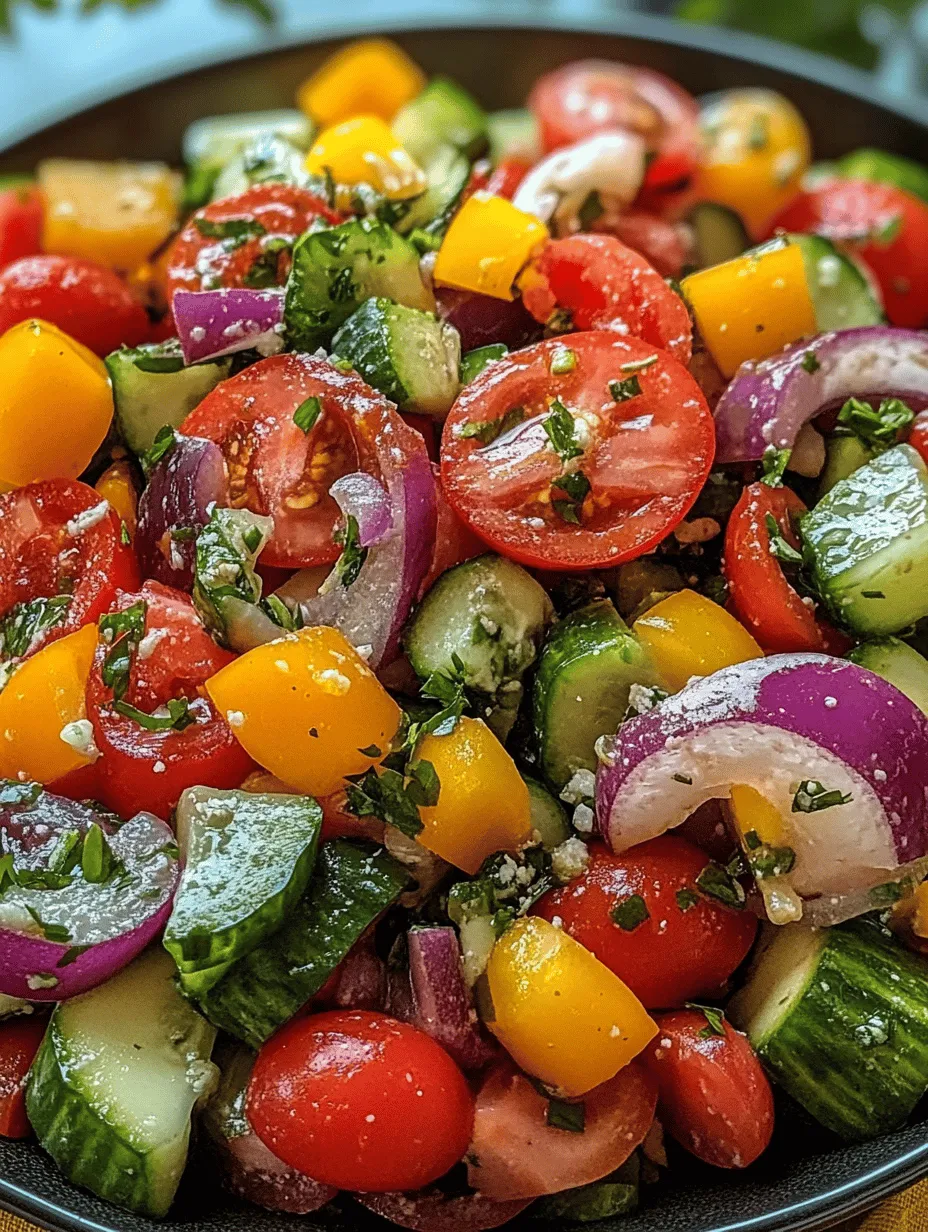WANT TO SAVE THIS RECIPE?
Greek salad stands tall as one of the most iconic dishes of the Mediterranean region. Its simplicity, vibrant colors, and unparalleled freshness capture the essence of Greek cuisine, a tradition that values natural flavors and wholesome ingredients. This dish, known locally as horiatiki, represents much more than a mere combination of vegetables; it symbolizes the harmony of nature and tradition.
The Roots of Greek Salad: A Blend of History and Tradition
Greek salad traces its roots back to ancient times, when Greeks relied on fresh produce to create nourishing meals. Farmers, shepherds, and villagers needed quick and hearty dishes that utilized ingredients from their fields and gardens. They combined vegetables, olives, and cheese to create balanced meals rich in flavor and nutrients.
As trade expanded in the Mediterranean, the Greeks incorporated elements from neighboring regions, which shaped their culinary identity. Despite these influences, the core components of the Greek salad remained steadfast, celebrating local produce and traditional practices.
Essential Ingredients: A Symphony of Freshness
The beauty of a Greek salad lies in its minimalism. Each ingredient plays a vital role in creating a dish that tastes as good as it looks. Every bite delivers a burst of flavors that transport diners to a sun-soaked terrace overlooking the Aegean Sea.
1. Tomatoes
Tomatoes serve as the heart of a Greek salad. Their natural sweetness and juiciness create the perfect base for this dish. Greeks often choose ripe, vine-grown tomatoes to ensure optimal flavor. Slicing them into chunks rather than thin slices helps retain their texture and allows their juices to mingle with the other ingredients.
2. Cucumbers
Crisp and refreshing cucumbers provide the perfect balance to the tomatoes’ sweetness. Their mild, cooling flavor contrasts beautifully with the tangy and salty components of the salad. Peeling the cucumbers is optional, but many prefer to leave some skin on for added texture and nutrients.
3. Red Onions
Sharp, slightly spicy red onions add depth and character to the salad. Thinly slicing or soaking them briefly in water can reduce their intensity, making them more palatable while preserving their distinctive flavor.
4. Bell Peppers
Green bell peppers contribute crunch and subtle bitterness to the salad. Their crisp texture complements the softer components and adds a layer of complexity to the flavor profile.
5. Kalamata Olives
Kalamata olives, native to Greece, enhance the dish with their rich, briny taste. Their dark purple hue contrasts beautifully with the vibrant greens and reds in the salad. Pitting the olives before serving ensures a more enjoyable dining experience.
6. Feta Cheese
Feta cheese, a staple of Greek cuisine, serves as the crowning jewel of the Greek salad. Made from sheep’s milk or a combination of sheep and goat milk, feta delivers a tangy, creamy flavor that ties the dish together. Unlike shredded cheese used in other salads, Greeks often place a large block of feta on top, allowing diners to crumble it as they please.
7. Extra Virgin Olive Oil
No Greek salad is complete without a generous drizzle of extra virgin olive oil. This golden elixir, extracted from Greek olives, adds richness and binds the flavors together. Its fruity aroma and smooth finish make it an indispensable component.
8. Dried Oregano
A sprinkle of dried oregano, preferably from Greek mountains, elevates the dish with its earthy and slightly peppery notes. Oregano symbolizes Greek culinary heritage and adds the final touch to this vibrant medley.
Preparation: An Artful Assembly
Making a Greek salad requires no elaborate techniques or cooking equipment. The process emphasizes preserving the natural flavors and textures of the ingredients. Begin by washing and chopping the vegetables into hearty pieces. Arrange them in a shallow bowl or plate, starting with the tomatoes and cucumbers as the base. Scatter the onions and bell peppers on top, followed by the Kalamata olives.
Place a block of feta cheese at the center and drizzle everything with extra virgin olive oil. Finish the salad with a sprinkle of dried oregano. Some variations include a splash of red wine vinegar for added tanginess or a light seasoning of sea salt, though the feta and olives often provide sufficient saltiness.
Cultural Significance of Greek Salad
The Greek salad holds a cherished place in Greek culture, symbolizing hospitality and connection to the land. It frequently appears on family dinner tables, at festive gatherings, and in seaside tavernas. Greeks view this dish as a celebration of their agricultural heritage, which thrives in the Mediterranean climate.
Seasonality plays a crucial role in its preparation. Greeks often prepare Greek salad during the summer months when tomatoes and cucumbers reach their peak ripeness. Serving this dish alongside freshly baked bread, grilled meats, or seafood completes the quintessential Greek dining experience.
Beyond its role in Greece, the Greek salad has gained international recognition. Restaurants around the world include it on their menus, introducing global audiences to the simplicity and elegance of Greek cuisine.
Health Benefits of Greek Salad
The Greek salad aligns with the principles of the Mediterranean diet, celebrated for its numerous health benefits. Each ingredient contributes valuable nutrients, making this dish both delicious and nutritious.
- Rich in Vitamins and Minerals
- Tomatoes provide a robust dose of vitamin C, potassium, and antioxidants like lycopene.
- Cucumbers deliver hydration and fiber, along with vitamins K and C.
- Red onions offer quercetin, a powerful antioxidant with anti-inflammatory properties.
- Bell peppers contain vitamins A and C, essential for skin health and immune function.
- Heart-Healthy Fats
- Olive oil serves as a primary source of monounsaturated fats, which support heart health and reduce inflammation.
- Feta cheese adds a moderate amount of healthy fats while contributing calcium and protein.
- Low-Calorie and Satiating
- The fiber and water content in vegetables promote satiety, making the Greek salad an excellent option for those seeking to manage their weight.
- Supports Digestive Health
- The fresh vegetables, combined with the olive oil, promote healthy digestion and gut health.
Variations of Greek Salad
While the traditional Greek salad remains a favorite, regional and modern variations add intriguing twists to this classic dish. These adaptations showcase its versatility and universal appeal.
1. Dakos Salad
This variation originates from Crete and features barley rusks as a base. The rusks absorb the juices from the tomatoes and olive oil, creating a flavorful and satisfying dish.
2. Village Salad
In some rural areas, locals include capers, fresh herbs, or pickled vegetables in their Greek salads, adding unique regional flavors.
3. Modern Twists
Contemporary chefs experiment with additions like avocado, quinoa, or grilled chicken to cater to evolving tastes and dietary preferences. While these versions deviate from tradition, they retain the essence of the Greek salad.
Pairing Greek Salad with Other Dishes
The Greek salad pairs seamlessly with a variety of dishes, enhancing the overall dining experience. Serve it alongside:
- Grilled Lamb or Chicken: The freshness of the salad complements the smoky flavors of grilled meats.
- Seafood: Pairing the salad with grilled octopus, shrimp, or fish highlights the Mediterranean theme.
- Soups and Stews: Lighten hearty dishes like lentil soup or moussaka with the crispness of the salad.
- Bread and Dips: Enjoy the salad with crusty bread, tzatziki, or hummus for a casual yet satisfying meal.
The Universal Appeal of Greek Salad
Greek salad transcends cultural and geographical boundaries, resonating with food lovers worldwide. Its adaptability makes it suitable for various occasions, from casual picnics to formal dinner parties. The balance of flavors and textures ensures that it never goes out of style.
Chefs and home cooks alike celebrate the Greek salad for its simplicity and authenticity. As people continue to embrace fresh, wholesome eating, this timeless dish stands as a beacon of healthful indulgence.
Greek Salad as a Culinary Ambassador
Greek salad has evolved into a culinary ambassador, introducing global audiences to the core principles of Mediterranean cuisine. In an age where fast food dominates, this dish offers a refreshing reminder of the beauty of fresh, whole ingredients. Restaurants, food festivals, and cooking shows across the globe have embraced Greek salad, showcasing its versatility and visual appeal. It embodies a philosophy of cooking that values simplicity without compromising flavor, making it a favorite for both casual diners and gourmet enthusiasts.
Greek Salad in Modern Lifestyles
In modern lifestyles where health-conscious eating prevails, Greek salad serves as a practical and flavorful choice. Busy schedules often leave little time for elaborate meal preparation, but Greek salad’s ease of assembly fits seamlessly into daily routines. Its nutritional profile aligns with current dietary trends, including low-carb, vegetarian, and gluten-free options. By incorporating Greek salad into meal plans, individuals not only enjoy a nutritious dish but also connect with a timeless culinary tradition that champions fresh, unprocessed foods.
Sustainability Through Seasonal Eating
Greek salad also promotes sustainability by encouraging the use of seasonal and locally sourced ingredients. By preparing it during the summer, when tomatoes and cucumbers thrive, one can reduce the environmental footprint associated with importing out-of-season produce. Supporting local farmers and markets ensures fresher, more flavorful ingredients while fostering a connection to the land. This practice mirrors the Greek tradition of honoring the natural rhythms of agriculture, creating a sustainable approach to enjoying this beloved dish.
Conclusion
Greek salad exemplifies the beauty of uncomplicated, ingredient-driven cuisine. It reflects the spirit of Greece, a nation that takes pride in its culinary heritage and connection to the land. Whether served as a side dish, main course, or part of a larger feast, Greek salad invites diners to savor the flavors of the Mediterranean.
Through its rich history, vibrant ingredients, and cultural significance, the Greek salad remains a beloved dish that continues to inspire and delight. With each bite, it reminds us that the best meals often come from the simplest of combinations—a philosophy that resonates across generations and borders.
WANT TO SAVE THIS RECIPE?

